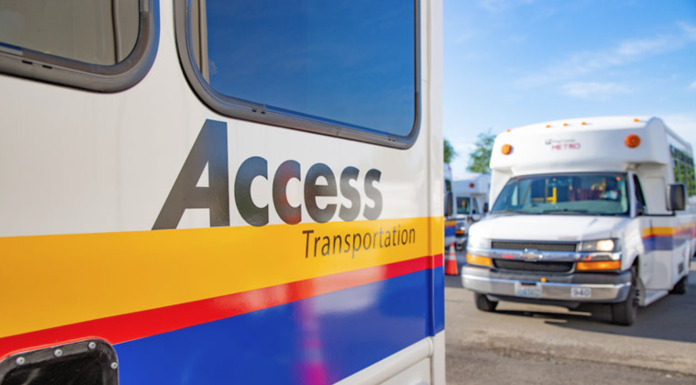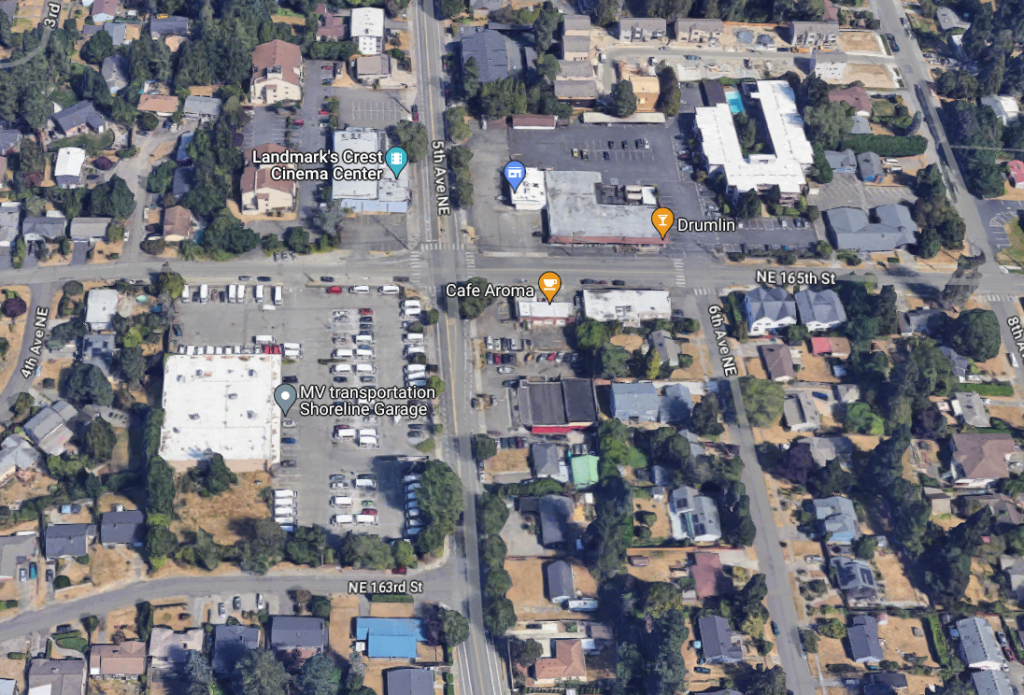
City council’s efforts to redevelop Ridgecrest imperil local paratransit access.
On Monday, the Shoreline City Council unanimously adopted an ordinance that blocks operation of most bus bases within the city, throwing the future of King County Metro’s current Access paratransit bus base in the Ridgecrest neighborhood into jeopardy. The fight pits Shoreline, with a long-range vision for more walkable amenities and more housing at the heart of one of its core neighborhoods, against the state’s largest transit agency and public transit access for people with disabilities.
Metro has operated on the 2.5-acre site opposite the Crest Landmark Cinema on 5th Avenue NE since 2012, serving approximately 100,000 annual trips for paratransit users from the base. Those trips provide mobility around 10,000 registered Access riders, many of whom are not able to use traditional Metro bus service due to a disability. Approximately 2,200 of those registered riders are located within Shoreline’s city limits.
The City of Shoreline views the bus base as an inappropriate use of the site given the current zoning, which is designed Commercial Business (CB) along with the movie theater and other nearby businesses. Metro views the use as that of an essential public facility, which local jurisdictions can’t turn away under Washington’s 1990 Growth Management Act (GMA). The issue is likely to end up in court, a move telegraphed Monday by both Metro and the property’s owner, Black Brandt, LLC.

The ordinance passed this week was a final step taken by the City of Shoreline with the long-term goal of forcing a new use of the site and preventing Metro from simply moving to another location within Shoreline that they don’t view as appropriate either. After King County Metro informed the City of Shoreline last year that it intended to purchase the base from the current property owner, the Shoreline City Council passed an emergency ordinance on July 17, prohibiting the city from considering permits for any type of bus base whatsoever for a period of six months. The staff report presented that night made the case for passage by stating that “transit bus bases and individual transportation and taxi facilities are incompatible with the City’s vision for several areas in the City.”
After the council extended the moratorium for another month just two few weeks ago, the permanent ordinance adopted on Monday bans the approval of bus bases within the city if they aren’t located directly on a state highway or, in most cases, larger than 10 acres — a size that’s slightly smaller than Metro’s North Base for fixed-route coaches, located just on the other side of I-5.
“We have tolerated for over 10 years the facility that is not in compliance with our code, in a neighborhood where it does not belong, and we have bent over backwards extending the period of time that facility was allowed to operate,” Councilmember Keith Scully said on Monday night. “We have bent over backwards trying to find an alternate location in Shoreline. Nothing about this ordinance bans transit access. Nothing in this ordinance has anything to do with the operation of the buses. That is Metro’s problem, not ours. What this ordinance does, is says we’ve had enough — we’ve tolerated this facility that does not belong there.”
Scully lashed out from the council dais during his remarks, suggesting that threats of legal action from Metro and the property owner amounted to bullying. “Very disappointed in what Metro had to say and what Black Brandt had to say. I don’t appreciate being bullied. I don’t appreciate being emotionally manipulated, and I don’t appreciate dishonesty,” he said.

King County Metro’s message to Shoreline is that the move has the potential to disrupt Access service from the site. “Tonight, the Council is poised to adopt development regulations that concern the Access facility and that are fundamentally flawed. They are designed to evict Metro from Shoreline, even though Shoreline welcomed and specifically allowed this use in 2012,” King County Metro General Manager Michelle Allison wrote to the city council in a letter dated Monday.
Metro is asking for more time to be able to fully plan for a replacement bus base, and sees a December 31, 2029 date as the earliest that it would be able to guarantee that it can vacate the property. Shoreline is trying to force Black Brandt, LLC, the property owner, to cease its current usage of the property by the end of 2026 via code enforcement, resulting in this impasse.
Shoreline alleges it has spent considerable time trying to find an alternative site for the base within the city limits. “Unfortunately, the sites proposed in the development regulations are not workable for Metro’s needs as we understand them today. Metro presented its needs to the City in November of 2023. Of the dozen or so parcels that might work for an alternative location under the proposed development regulations as drafted, none meet Metro’s needs,” Allison wrote.
“As Metro understands the development regulations today, there is no viable alternative for the current Access facility in Shoreline,” Amanda Pleasant-Brown, speaking on behalf of Metro, said Monday night. “The number of parcels that meet both the development regulations as proposed and Metro’s needs as we understand them is zero.”
“Beyond being illegal and introducing unnecessary legal risk to the City of Shoreline, together with the enforcement action, [the city council’s actions] create immediate jeopardy to Metro’s ability to deliver federally required Access services,” Allison wrote in her letter. “That means that people who cannot use regular fixed-route services due to a disability will have difficulty getting to doctors appointments, shopping for groceries, attending church, or going to work or school.
Andrew King, King County’s deputy prosecuting attorney handling the matter, has asked Shoreline to resolve the outstanding issue of whether the bus base is an essential public facility. The next step here is almost certainly a filing at the state’s Growth Management Hearings Board.
“We do not want to bring additional lawsuits in order to get your attention, but the city has harmed us, and it continues to harm us and we are running out of options,” Teresa Richards, speaking on behalf of Black Brandt, LLC, said on Monday.
How detrimental a years-long legal battle ends up being for transit riders who depend on Access service remains to be seen. But it’s not likely that the avenue that Shoreline is pursuing in order to create a more walkable Ridgecrest is likely to yield returns anytime soon.
Ryan Packer has been writing for The Urbanist since 2015, and currently reports full-time as Contributing Editor. Their beats are transportation, land use, public space, traffic safety, and obscure community meetings. Packer has also reported for other regional outlets including Capitol Hill Seattle, BikePortland, Seattle Met, and PubliCola. They live in the Capitol Hill neighborhood of Seattle.


